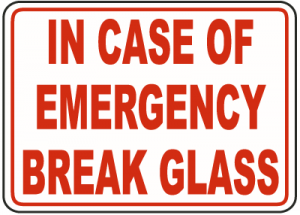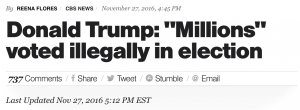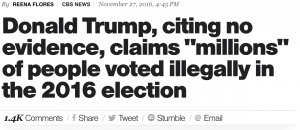An editorial company is a strange beast. Ask Verizon.
Remember SugarString? You should, now that AT&T has bought CNN, along with the rest of Time Warner. SugarString was a tech news site started by Verizon. Here’s what happened:
In exchange for the major corporate backing, tech reporters at SugarString are expressly forbidden from writing about American spying or net neutrality around the world, two of the biggest issues in tech and politics today.
Unsurprisingly, Verizon is deeply tangled up in both controversies.
AT&T executives are making all the right sounds about CNN’s independence. They seem to be smarter about it than Verizon was. The point I want to raise is this: a telecommunications giant with no tradition as an editorial company may not realize what a huge challenge it is to make a space for journalists to do their work without interference or restrictions.
An editorial company is organized in a different way than every other kind of business. In one part of itself it has to take actions that can injure another part of the company or anger key customers, and — crazy as it sounds — this is the right way to run the business. Not everyone who understands the telecommunications industry will understand that. Just ask the editors of SugarString, which of course no longer exists.
These are the problems in pressthink that most concern me now.
A live list. Updated from time to time. Ranked by urgency.
1. The President of the United States is proceeding as though he were liberated from the distinction between true and false. His spokespeople are following on this dubious lead. What does the press do in response?
2. It’s possible we are sliding toward authoritarian rule. That’s a development journalists ought to oppose with all their might. But they are reluctant to think that way. They don’t want to be on the opposing team— or anyone’s team. They just want to report the news. “We’re not the opposition,” they say. Yet they may have no choice. From what traditions can they draw to rise to the occasion, and find the will to fight?
3. With Trump in power there is a surplus of eventfulness, too many things to report, track, investigate, critique. Too much news! How does the press keep from exhausting itself and fracturing our attention into too many pieces?
4. Faced with a government uniquely hostile to it — hostile to countless norms of democracy that were once observed by both parties — the press is tempted to steady itself by saying: just do the job, the job hasn’t changed. But what if it has changed?
5. A development long in train was solidified with the 2016 election. Somewhere between 25 to 35 percent of the electorate agrees with the President that the mainstream media can never be trusted. (“Fake news.”) They would rather get their Trump news from Trump. So now what?
6. If a newsroom were optimized not for ratings, scoops, conflict, drama, entertainment, prizes, headlines, or “story”… but always for trust, what would that even look like? How would it behave differently from what we commonly see?
7. There has been a surge in dollar support for major news organizations as Americans alarmed by the Trump presidency look to journalists for help. How can the beneficiaries of this support solidify it beyond the emergency atmosphere in which it was born and earn the trust that has been placed in them?
8. Fahrenthold! During the 2016 campaign, the Washington Post reporter singlehandedly struck a blow for accountability journalism with his open and approachable style of investigating Trump’s philanthropy. How can the lessons of his success be spread to more practitioners?
9. The Big Listen: How can journalists get radically better at listening to the electorate, and what does that mean in practice?
10. The events of 2016 were a debacle for political journalism, a devastating blow. It would be folly to move on without a searching examination of what prepared the ground for this collapse. But now the same institution is under enormous pressure simply to keep up with the Trump regime. It is moving on. Where is the space for learning, regret, disavowal, doubt and reflection?
The Gamergate model of press relations
I remember the first time I heard about Gamergate. A random follower on Twitter asked me if I had been following the story, which he said was “about ethics in games journalism.” No, I had not been following the story. In all innocence, I clicked on the link he sent me and tried to make sense of what I read. I failed. The events it described were impenetrable to me. (Disclosure: I am not a gamer.)
Eventually I learned what Gamergate really was. The more I learned, the more depressed I felt. The people who promoted Gamergate said they were concerned about journalism ethics. As a professor of journalism with a social media bent, I felt obligated to examine their claims. When I did I discovered nasty troll behavior with a hard edge of misogyny. “It’s about ethics in games journalism” became an internet joke. Deservedly so.
Recently Ben Smith, the editor-in-chief of Buzzfeed’s news operation, wrote: “The big story of 2014 was Gamergate, the misogynistic movement championed by Breitbart and covered primarily by new media. That turned out to be a better predictor of the presidential election than any rubber chicken dinner in Iowa (or poll by a once-reputable pollster).”
Ben is right. The Gamergate model in press relations posits that high-risk tactics should not be ruled out of consideration. It says that rejection and ridicule by the mainstream media can be a massive plus, because events like these activate — and motivate — your most committed supporters: your trolls. The Gamergate model proposes that transgressing the norms of American democracy is not some crippling defect, as previously believed, but a distinct advantage because the excitement around the transgression recruits new players to the fight, and guarantees the spread of your content.
The Gamergate model anticipates that the mainstream press will freak out. Full stop. And it seeks to profit from this reaction. What the traditional press considers negative publicity is, from the Gamergate point of view, a kind of gift to The Leader. Trump and his advisors have absorbed these lessons. Gamergate is thus one possible template for the future of White House-press corps relations. Those who have not studied it carefully will be at a distinct disadvantage.
Amplify false claim, get slammed for it online, take it down. Next week, repeat the process.
This is CBS News, struggling to catch up with the realities of Trump-Pence.
CBS had this headline up Nov. 27:
They caught hell for it online. For reasons I explain in this post: Evidence-based vs. accusation-driven reporting.
Around 8 pm that night, CBS changed the headline:
A week later, same deal: same mistake, same dispute: voter fraud. The original tweet:
Again they catch hell for it online. Again, they change it.
CBS News: You need a learning curve that’s steeper than this. You also need to graduate from “without evidence” to “just plain false.”
Hey, that’s not what I said.
Tom Rosenstiel is out with an very smart piece explaining how journalists should — and should not — react after the election of Donald Trump upon a wave of resentment, including a lot of anger at the press.
What he has written has many virtues. It is calm. It is the voice of experience. (Rosenstiel is a journalist, a former political reporter, in fact, but also a student and maker of change in journalism, as executive director of American Press Institute.) His counsel is wise. And it is insightful about how much the world has changed for people in the press. The changes are, as he says, “structural.” They involve the environment into which journalism emerges. Thus: “It is no longer enough to simply gather and report good stories.” So true. I thought this part especially sharp:
Journalists need to understand the way that information flows. We need them to understand the information platforms that will carry their reports and the networks of people who will share that information. It is not enough to build the ships. We need to understand the ocean they will navigate.
That is precisely what those who want to pass along propaganda and falsehood are doing. Uninterested in gathering facts, they have spent their time instead studying instead how information moves.
Exactly! The whole essay is thoughtful and worth your time. I urge you to read it. [Pause.]
Then there’s the part in which I figure. I have a complaint about that, and while I know it is a small matter (tiny, really) it still matters to me because what I said was misrepresented, first by Michael Oreskes, Senior Vice President of News at NPR, and then by Rosenstiel, relying on Oreskes.
The context: a campaign appearance by Trump at a Black church in Detroit. “The pastor called Trump on the carpet for attacking Hillary Clinton when he had promised not to be partisan. Trump later attacked the pastor and misstated key facts about what actually happened,” Oreskes wrote, citing this report by NPR’s Scott Detrow. Oreskes observes:
We should not be telling you how to think. We should give you the information to decide what you think.
Scott did that and we are proud of him. Now a number of people have asked us why we didn’t call Trump a liar. A professor named Jay Rosen actually asked why we didn’t call Trump a “lying son of a b****.” Others, like Amy Bradley-Hole, a fashion editor and blogger, asked the question more calmly.
I didn’t do what Orsekes said, as I will show you in a minute. Tom Rosensteil, relying on Oreskes, put it this way:
That same week, NPR took fire for a story in which it said that Trump had misstated facts about a meeting in Detroit with a black pastor. New York University’s often emphatic professor Jay Rosen berated NPR for not calling Trump a “lying son of a b****.”
I didn’t do what Rosenstiel said, either. They’re both referring to a tweet I posted on Sep. 15. This is the tweet:
This is what NPR says instead of: “Trump, you are one lying son of a b—-.” https://t.co/VESR2LS4VJ
— Jay Rosen (@jayrosen_nyu) September 15, 2016
I didn’t ask NPR why they refused to call Trump a lying son of a bitch, as Oreskes claimed. I didn’t berate NPR for not calling Trump a liar, as Rosenstiel claimed. I made a factual statement: This is how NPR talks. This is their voice. This is how they render it. And I explained it that way when people responded to me on Twitter:
@juniper9119 I don’t know that it would. But the phrasing and framing tells you something about NPR.
— Jay Rosen (@jayrosen_nyu) September 15, 2016
Now I do think there’s a culture of timidity at NPR and I have said that many times. But I didn’t berate NPR for not calling Trump a lying son of a bitch, or ask why they declined that phrasing.
One more point and I will conclude my complaint about this exceedingly tiny matter. Oreskes didn’t quote me, link to the tweet he was referring to, or embed it. That matters because he was jamming me into a rhetorical space where the fit is not quite right, “pushing off” from my extreme claim to make room for himself in the reasonable center. Rosenstiel didn’t quote me, or link to the original, either. Not fair.
I am currently writing something in which I plan to point out that Sean Hannity has argued that the mainstream press corps should not be allowed to cover Trump until they admit they colluded with the Clinton campaign. There is no way I would include that bit of information without linking to where he said it. That should be standard practice. What Oreskes did is bad practice.
UPDATE: Oreskes apologized on Facebook for this, graciously adding that the focus should be on Rosenstiel’s essay and not this kerfuffle. “You are correct. I wrote more than the tweet said. I apologize. Moreover, I’d like to say I do not consider Jay Rosen extreme.” So: happy ending!
Me in a 2010 interview with The Economist:
Suppose the forces that want to convince Americans that Barack Obama is a Muslim or wasn’t born in the United States start winning, and more and more people believe it. This is a defeat for journalism—in fact, for verification itself. Neutrality and objectivity carry no instructions for how to react to something like that. They aren’t “wrong”, they’re just limited. The American press does not know what to do when neutrality, objectivity, balance and “report both sides” reach their natural limits. And so journalists tend to deny that there are such limits. But with this denial they’ve violated the code of the truth-teller because these limits are real. See the problem?
Neutrality has limit cases
For the first time in its existence — almost 50 years — Foreign Policy magazine has endorsed a candidate for President, and decisively rejected Donald Trump. That’s been happening all over. But in explaining why they took this step, the editors made a call that I want to highlight for you. Read this carefully:
We cherish and fiercely protect this publication’s independence and its reputation for objectivity, and we deeply value our relationship with all of our readers, regardless of political orientation.
It is for all these reasons that FP’s editors are now breaking with tradition to endorse Hillary Clinton for the next president of the United States.
Notice what they’re saying: Because we zealously guard our independence and objectivity, we feel compelled to warn you about Trump. That’s not a rejection of our non-partisan principles, but an extension of them through extraordinary times.
We have a strong relationship with readers in both parties. We would be failing in that relationship if we didn’t speak up now.
“We feel that our obligation to our readers thus extends now to making clear the great magnitude of the threat that a Donald Trump presidency would pose to the United States.”
The idea of not taking a side — which has its own integrity — only has that integrity if it has limits built-in. A lot of journalists are discovering those limits this year. This is a good thing.

The most common replies I receive on Twitter
1. “And this surprises you?” Number one by a mile. Alt version: “I’m shocked, shocked to hear that…”
2. “But his supporters won’t care!” A reference to our president-elect. This one has been soaring lately.
3. “Nothing new here.” No claim of newness needs to have been made. The history lesson is going to come anyway.
4. “It’s about the ratings.” Because nothing else counts. Includes all versions of the “follow the money” cliche.
5. “It’s been tried, didn’t work.” A special version of “nothing new.” Favorite of the tech community.
Note: This list does not include abusive replies.
In emergencies newsroom trust is won
The Herald carrier force was decimated by the storm. We assembled a substitute force that included people from every division including publisher and the editor. We distributed the paper free to any house that showed evidence that people lived there. —Doug Clifton, former editor of the Miami Herald
Many times did I listen to editors at the Miami Herald reflect on Hurricane Andrew (1992) and their relationship with the community. What they recalled was extreme devastation: flattened homes and lives in the circulation area that the Herald reached. The newspaper was able to print, but delivery systems were busted, so Herald staffers from the publisher’s office to the mail room had to pitch in and help.
After the storm they rode through devastated neighborhoods with copies of the paper, hurling them into damaged homes without knowing if anyone was in there. To their shock people would emerge out of half-destroyed houses and retrieve the newspapers that had been tossed into the rubble. These people were desperate for news, any kind of news, and they wanted to know if their situation was typical or exceptional.
For the people of the Miami Herald the lesson was: when the users really, really need you, you have to deliver. But if you can deliver, you can earn in a few hours or days a kind of trust that may last for years. In any civic emergency that equation is alive.
Trump is a threat to press freedom, yes, but it goes beyond that
“This is not about picking sides in an election,” says the statement released today. “This is recognizing that a Trump presidency represents a threat to press freedom unknown in modern history.”
The statement is from Sandy Mims Rowe, chair of the Committee to Protect journalists, which ordinarily focuses on dictators jailing editors overseas.
On October 6, CPJ’s board of directors passed a resolution declaring Trump an unprecedented threat to the rights of journalists and to CPJ’s ability to advocate for press freedom around the world.
But the Committee’s declaration actually understates the threat. I’m not criticizing it; they’re staying within their brief. But we have to recognize a second layer of danger.
In the world Trump wants for us, the glamorizing entertainment media still exists. The strongman’s propaganda state still exists. The kind of journalism we can use to inform ourselves and check the powerful would be almost pointless. For he is actively running against such basic notions as:
* “We need a fact-based debate or there cannot be consent of the governed;”
* “There is something called the public record that cannot just be wiped away;”
* “A candidate’s position on major issues should be made clear to the voters;”
* “Lying cannot become a universal principle in politics without major damage to our democracy.”
The critic Paul Rosenberg said something important about this last week: “The purpose of the press in a democracy is to help make a society legible to itself.” Exactly: legible to itself.
With his non-stop lying and conspiracy mongering, his refusal to articulate and hold positions, his contempt for the public record — and even for the idea that candidates should have a grasp of the major issues facing the country — with the confusion and hatred of the other that he sows in every speech, Trump stands for the ruin of any fact-based debate to which the healthy practice of journalism can contribute.
Is the Muslim ban still on? How can we debate it if no one knows? As I wrote here, a political style that mocks the idea of a common world of facts is an attack on the very possibility of honest journalism.
It’s bigger than imperiling the freedoms journalists need to do their job. Trump is campaigning to make American society illegible to itself. That is a threat to pull the press out by its roots.
Platforms in charge
Recode.net, October 7, 2016.
Snapchat is making a small but important tweak to how it displays, and then plays, user Stories inside its app.
First, Snapchat is putting user Stories at the very top of the Stories page. That means you’ll likely see more of your friends’ Stories “above the fold.”
The new design creates an obvious group of losers: Snapchat’s Discover publishing partners, who used to occupy the top of that page and will now have their channels listed below all of your friends’ stories. Depending on how many friends you have on the app, that could mean lots of scrolling before you come across Discover content.
Recode.net, June 29, 2016
Facebook is tweaking its News Feed algorithm to prioritize posts that come from users’ family and friends, which means you’ll soon see more posts from actual people like your cousins or your college roommates.
But seeing more posts from friends and family also means seeing fewer posts from non-human accounts, specifically publishers like BuzzFeed or the New York Times, newsrooms that rely heavily on Facebook’s massive audience for web traffic and ad revenue.
Up in the Tower with the TV on
Trump huddled with advisers at Trump Tower on Saturday and was cheered by 100 supporters when he emerged, grinning and pumping his fist, shortly after 5 p.m. — New York Post, Oct. 9, 2016
When you see phrases in the press like “huddled with advisers,” or “the Trump war room,” keep this in mind: Most likely, he’s up in The Tower watching himself on cable TV, surrounded by people who are failing to get his attention for the matter at hand.
A reporter who interviewed Trump at one his golf clubs:
“He was seated so that right behind me was the television screen tuned to Fox News. And every time Fox showed Donald Trump on the screen or a statement that Trump had made or they had a reporter doing a live shot in front of Trump Tower in New York, Donald Trump commented on it. He was very excited to see himself on the TV. So he was not fully focused on the interview.”
Maggie Haberman from the New York Times describing a scene of Trump holed up with his advisors:
Mr. Trump called a few reporters but lacked his usual gusto. And he kept returning to watching coverage on CNN, the cable outlet he derides as biased against him but still tunes in to most often, and becoming more upset as he saw Republican officials condemn him one by one.
Trump and the news media is like an abusive relationship: God, I love you/You made me do this to you.



